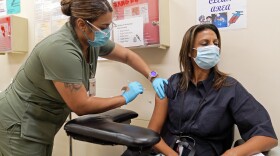
Rob Stein
Rob Stein is a correspondent and senior editor on NPR's science desk.
An award-winning science journalist with more than 30 years of experience, Stein mostly covers health and medicine. He tends to focus on stories that illustrate the intersection of science, health, politics, social trends, ethics, and federal science policy. He tracks genetics, stem cells, cancer research, women's health issues, and other science, medical, and health policy news.
Before NPR, Stein worked at The Washington Post for 16 years, first as the newspaper's science editor and then as a national health reporter. Earlier in his career, Stein spent about four years as an editor at NPR's science desk. Before that, he was a science reporter for United Press International (UPI) in Boston and the science editor of the international wire service in Washington.
Stein's work has been honored by many organizations, including the National Academy of Sciences, the American Association for the Advancement of Science, the American Association for Cancer Research, and the Association of Health Care Journalists. He was twice part of NPR teams that won Peabody Awards.
Stein frequently represents NPR, speaking at universities, international meetings and other venues, including the University of Cambridge in Britain, the World Conference of Science Journalists in South Korea, and the Aspen Institute in Washington, DC.
Stein is a graduate of the University of Massachusetts, Amherst. He completed a journalism fellowship at the Harvard School of Public Health, a program in science and religion at the University of Cambridge, and a summer science writer's workshop at the Marine Biological Laboratory in Woods Hole, Mass.
-
A Mississippi woman's life has been transformed by a treatment for sickle cell disease with the gene-editing technique CRISPR. All her symptoms from a disease once thought incurable have disappeared.
-
The Third International Summit on Genome Editing concluded Monday with ethicists warning scientists to slow down efforts to use gene-editing to enhance the health of embryos.
-
Victoria Gray's life has been transformed by her treatment for sickle cell disease with the gene-editing technique called CRISPR. She's in London telling her story at a scientific summit.
-
The last time this summit convened in 2018, the world was shocked to hear a scientist had created the first gene-edited babies. He was condemned, but gene-editing has continued, with some success.
-
After three years, the Johns Hopkins Coronavirus Resource Center is ceasing operations. Its data dashboards and maps became go-to sources for information from the early days of the pandemic.
-
The main reason the surge is ebbing now, pandemic experts suspect, is the significant immunity many people in the U.S. have acquired from prior infections and COVID vaccinations many received.
-
The Food and Drug Administration proposes easing many restrictions on gay and bisexual men donating blood.
-
Long criticized as discriminatory, the policy has prevented many gay and bisexual men from donating blood. The Food and Drug Administration revealed a draft of its new approach on Friday.
-
FDA advisers debate the agency's controversial proposal to start handling the COVID vaccines like the flu shots — updating them annually to target the most likely strain to be dominant each winter.
-
The new approach would simplify vaccination guidance so that, every fall, people would get a new shot, updated to try to match whatever variant is dominant.







